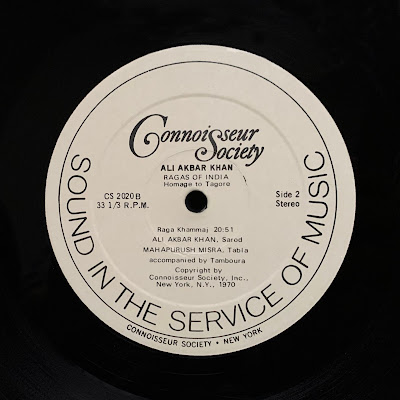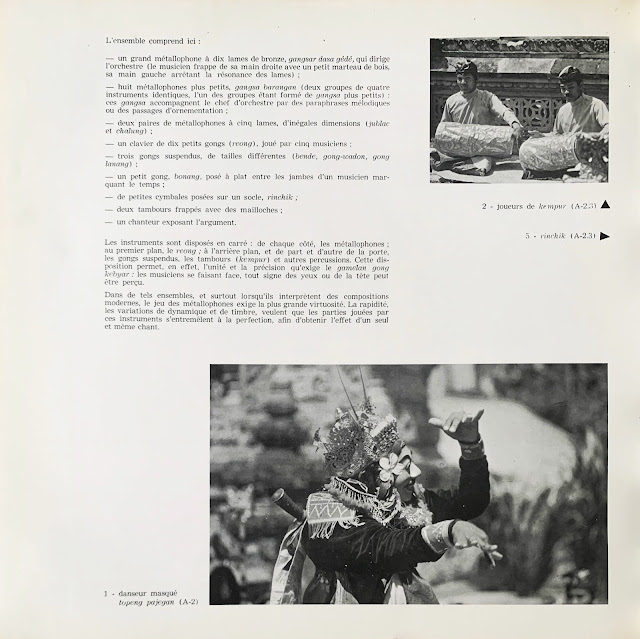GUINEA – GUINÉE
L’Ensemble Instrumental Africain de la Radiodiffusion Nationale – La République de Guinée – Sons Nouveaux d’une Nation Nouvelle – Tempo 7010 - recorded in 1961 (LP)
Recorded in 1961 to celebrate the third anniversary of Guinea’s independence, this mellifluous album features the newly formed (also in 1961) Ensemble Instrumental Africain de la Radiodiffusion Nationale, composed of 30 of the country's most prominent musicians and griots from various regions, directed by the brilliant singer and ngoni lute player Kouyaté Sory Kandia* (1937-1977). This ensemble includes a women's choir, balafons, flutes, 21-stringed kora harps, six-stringed ngoni lutes, and djembe and dunun percussion (A1, A3, B2, B4). The other tracks are performed by Sory Kouyatè, Diarraba Kandé & Djigui Diabaté on balafons (B1), M'Bady Kouyaté on kora harp (A2 & B3) and Mama Niang on ngoni lute (A4 & B5).
After independence there was a push to modernize traditional music, including the Mandé musical heritage, which led to the emergence of popular bands that incorporated Western instruments. Kandia was himself a great traditional artist and a renaissance spirit, who revisited the traditional Mandingo repertoire bringing in modern instruments such as electric guitars (brilliantly played by djeli kora masters) and horns. Kandia, along with more modern ensembles such as Bembeya Jazz National and Keletigui et ses Tambourinis, created a distinctive sound with many wonderful records released on the essential Guinean label Syliphone, which made Guinean music a major stylistic center during the golden age of African urban music.
Enregistré en 1961 pour célébrer le troisième anniversaire de l'indépendance de la Guinée, cet album mélodieux présente le tout nouvel Ensemble Instrumental Africain de la Radiodiffusion Nationale, composé de 30 des plus éminents musiciens et griots de diverses régions du pays, sous la direction du brillant chanteur et joueur de luth ngoni Kouyaté Sory Kandia* (1937-1977). Il comprend également un chœur de femmes, des balafons, des flûtes, des harpes cora à 21 cordes, des luths ngoni à six cordes, ainsi que des percussions djembé et dunun (A1, A3, B2, B4). Les autres morceaux sont interprétés par Sory Kouyaté, Diarraba Kandé et Djigui Diabaté aux balafons (B1), M'Bady Kouyaté à la harpe kora (A2 & B3) et Mama Niang au luth ngoni (A4 & B5).
Après l'indépendance, la musique traditionnelle, y compris l'héritage musical mandingue, fut modernisée, ce qui a conduit à l'émergence d’orchestres incorporant des instruments modernes. Kouyaté Sory Kandia était lui-même à la fois un grand artiste traditionnel et un esprit universel; il revisita le répertoire traditionnel mandingue en utilisant, à l’occasion, des instruments modernes, notamment des guitares électriques (brillamment jouées par des djeli maîtres de la cora) et des cuivres. Kouyaté Sory Kandia, ainsi que des ensembles plus modernes tels que Bembeya Jazz National et Keletigui et ses Tambourinis, ont créé un univers sonore avec un caractère distinctif grâce à la publication nombreux disques magnifiques sur l'incontournable label guinéen Syliphone. La musique guinéenne est ainsi devenu un centre de style majeur de l’âge d’or de la musique africaine urbaine.
A1 – Koulandian
Ensemble Instrumental Africain de la Radiodiffusion Nationale;
A2 – Diaka
M'Bady Kouyaté, 21-string kora harp; father Djely Mady Kouyate;
A3 – Mo Benni Ibara Le
Ensemble Instrumental Africain de la Radiodiffusion;
A4 – Laguya
Mama Niang, ngoni six-string lute;
B1 – Diandjo
Sory Kouyatè, Diarraba Kandé, Djigui Diabaté, balafons;
B2 – Gnalen Gbassa
Ensemble Instrumental Africain de la Radiodiffusion;
B3 – Malan Sambouya
M'Bady Kouyaté, 21-string kora harp;
B4 – Alou Kele Bila
Ensemble Instrumental Africain de la Radiodiffusion;
B5 – Badara
Mama Niang, ngoni six-string lute.
*Born in Bodié, Dalaba, Guinea, into a prestigious lineage of griots, Kouyaté Sory Kandia (pictured in the center of the back cover) learned his art, beginning at the age of seven, from his father, Djely Mady Kouyaté, who taught him the oral history and music of the Mandingo world. A former Empire of Mali, this powerful nation, founded in the 13th century by the legendary Sundjata Keïta (1190-1255), encompassed modern-day Sénégal, The Gambia, Guinea, Mali, Burkina-Faso and Ivory Coast. The young prodigy joined his father as a musician at the royal court of Mamou between 1947 and 1949, and in 1956 embarked on a highly acclaimed tour of Europe, the USA and the USSR with the Ballets Africains under the direction of Keïta Fodéba (1921-1969). With hits such as Nina recorded with the Ballets Africains, he established himself as one of West Africa’s most iconic singers, nicknamed “the golden voice of the Mandingo.” He went on to direct the Ensemble Instrumental Africain de la Radiodiffusion Nationale and record groundbreaking LPs for the Guinean label Syliphone.
*Né à Bodié, dans le Dalaba, en Guinée, dans une prestigieuse famille de griots, Kouyaté Sory Kandia (voir photo au centre au verso de la pochette) apprend son art dès l'âge de sept ans auprès de son père, Djely Mady Kouyaté, qui lui transmet la tradition orale et la musique de l'univers Mandingue – l'ancien Empire du Mali, fondé au XIIIe siècle par la légendaire Sundiata Keïta (1190-1255), qui s’étendait sur un territoire englobant le Sénégal, la Gambie, la Guinée, le Mali, le Burkina-Faso et le nord de la Côte d'Ivoire. Entre 1947 et 1949, le jeune prodige rejoint la cour royale de Mamou comme musicien aux côtés de son père. En 1956, il entame une tournée très remarquée en Europe, aux États-Unis et en URSS avec les Ballets Africains sous la direction de Keïta Fodéba (1921-1969). Avec des succès tels que Nina, enregistré avec les Ballets Africains, il s'impose comme l'un des chanteurs les plus emblématiques d'Afrique de l'Ouest, surnommé « la voix d'or du Mandé ». Il dirige ensuite l'Ensemble Instrumental Africain de la Radiodiffusion Nationale et enregistre des superbes disques sur le label guinéen Syliphone.
Here’s a terrific little-known long version of Tara that includes
the vocals of Kouyaté Sory Kandia:
Our other Guinean music posts:
Musique d’Afrique Occidentale – LDM 30116 here
Afrique Vol. 2 – Vogue EXTP 1029 here
Afrique Vol. 4 – Vogue EXTP 1032
Photograph below is from Le Corps Africain by Alain-Michel Boyer,
Hazan 2007:
Please help me purchase important traditional records to
pursue my global curation project and share the
best finds with you on this blog here below:



.jpg)


%20-9%2053.jpg)
%20-12%2042.jpg)
%200%2047%20(1).jpg)
_P.310%20-9%20100%20CROP.jpg)



















